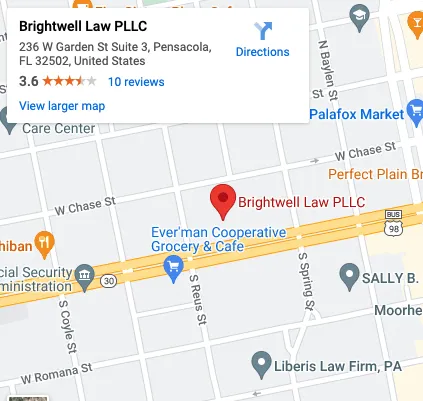Know Your Legal Options From A Family Law Attorney in Pensacola, FL
Legal separation has different meanings in different legal systems. Thus, consulting a knowledgeable Legal Separation Attorney in Pensacola, FL is strongly advised. This can be beneficial for couples who may not be ready or willing to pursue a divorce but still need some time apart to address their issues.
Our legal team at Brightwell Law PLLC helps clients navigate the legal process of separation, which can include drafting a separation agreement that outlines the terms of the separation, such as child custody and support, property division, and spousal support.
If you have inquiries regarding what constitutes legal separation in Florida, the process, or the benefits of separation, our Pensacola family law attorney can help. Contact us right away to find out more.
What is Legal Separation in Florida?
A married couple may want to separate while still legally married by pursuing a legal separation. It is permitted by court order and offers a way to preserve your marital status. There are many reasons why people ask for legal separation, but usually, it’s for religious reasons or to keep their health benefits.
However, Florida does not acknowledge the idea of legal separation. On the other hand, it does have legal provisions addressing spousal support, child custody issues, and visiting schedules. In other words, during a marital separation, either party may ask the court for child support or, in rare situations, alimony.
You may or may not be eligible to request child support if you are married, separated, and have children. Florida law offers an alternative to a legal separation called “Support Unconnected with Dissolution of Marriage,” which, if filed, enables the couple choosing to live apart to have preset terms which can be approved by the court.
Additionally, one or both parties could agree to the conditions of the separation through a mediation or settlement procedure without consulting the courts. In this case, the terms of the contract are enforceable in court as a binding contract. In conclusion, notwithstanding the fact that Florida does not permit “legal separations,” there are still options available to you that can help you get similar outcomes and establish child support while you are still legally married.
What Differentiates a Legal Separation from a Divorce?
The fact that not all states allow spouses to petition for separation is one of the biggest distinctions between divorce and legal separation. Every state permits couples to petition for divorce, which gives the court the power to resolve major divorce-related issues and terminate their marriage. Both couples are ultimately free to be remarried in the end.
The parties to a legal separation can ask the court for orders establishing child custody, child support, debt and property division, and spousal support, just like in a divorce procedure. The main difference between the two processes is that after a separation, a couple is still considered legally married. Hence neither can remarry if at least one party requests that the case be changed to a formal divorce. The same legal issues, such as custody, are addressed by both procedures, but only divorce permanently changes your marital status.
What are the Benefits of Legal Separation in Florida?
Couples that intend to live apart but don’t want to divorce but want to formally clarify issues like child support, child custody, and property distribution may find legal separation appealing. Couples who anticipate a permanent separation, as opposed to a brief trial separation, are often subject to a formalized separation. The financial advantages of continuing to be married (like tax incentives) and religious convictions that may conflict with divorce are two common reasons why a couple would choose to separate rather than divorce.
Couples might also benefit from the legal certainty that comes with divorce orders. Along with the division of property rights between the two parties, child support, child custody, and spousal support obligations and rights are also divided. Couples can easily agree on such issues without needing a court order, but getting a court-approved separation makes it simpler to pursue these rights in the event that conflicts occur.
What Rights Are Given to Spouses During a Separation?
A court can make decisions on things like child custody and support, alimony, and property division during a legal separation procedure. However, as mentioned, the couple will continue to be legally married and cannot get remarried until they file for divorce.
Among the most frequent issues that arise between separating couples include:
- if one spouse qualifies for temporary alimony
- what the appropriate amount of child support should be when there are minor children
- rights to the family home, such as who will pay the mortgage and whether either spouse has the right to stay in the marital house during the separation.
- which debts each spouse has to pay.
What Is Alimony or Separate Maintenance in a Legal Separation?
Separate maintenance refers to the payments made to one spouse after the couple has obtained a legal separation. Although it is comparable to alimony—the financial support provided to an ex-spouse after a divorce—because the couple is still technically married, it is not known as alimony.
One spouse typically has a lesser earning potential than the other when a couple legally separates. The majority of separate maintenance awards have the intention of assisting the financially dependent spouse in achieving financial independence. Similar to the methods they use to establish alimony, judges frequently employ similar factors to determine separate maintenance payments. The amount and duration of maintenance will particularly be determined by:
- the income of the spouses
- each spouse’s capability for earning
- how old is each spouse is
- the health of each partner
- the marriage’s length, and
- any other factors mandated by state law.
In a “separate maintenance decree” or “separate maintenance order,” judges who grant separate maintenance frequently outline the details of the award.
Why Do I Need a Legal Separation Attorney in Pensacola, FL?
If you and your spouse are considering a legal separation in Pensacola, FL, it’s important to consult with a legal separation attorney. Here are some reasons why:
- Understanding of Florida Separation Laws: A legal separation attorney is familiar with the laws governing separation in Florida. They can provide guidance on the legal implications of separation, such as property division, spousal support, and child custody.
- Legal Documents Preparation: A legal separation requires legal documents, such as a separation agreement, which outlines the terms of the separation. An attorney can help you prepare these documents to ensure that your interests are protected and that the agreement is enforceable.
- Protection of Your Interests: A legal separation attorney can help ensure that your interests are protected during the separation process. They can negotiate on your behalf to ensure that the terms of the separation agreement are fair and equitable.
- Mediation and Negotiation: A legal separation attorney can help you negotiate with your spouse or their attorney, to avoid court litigation. Mediation and negotiation can save time and money.
- Legal Representation in Court: If your separation leads to a dispute that cannot be resolved through negotiation or mediation, you may need to go to court. A legal separation attorney can represent you in court and advocate for your interests.
At Brightwell Law PLLC., a legal separation attorney in Pensacola, FL, we can provide invaluable assistance throughout the legal separation process, from understanding the law and preparing legal documents to negotiate on your behalf and representing you in court, if necessary.
Get in touch with us today through our hotline or through the chatbox located at the lower right of our homepage website.
Call our Pensacola, FL Legal Separation Attorney Now!
In most cases, a legal separation has no negative financial effects on either partner and might even help keep the marriage together. Separate maintenance will give you and your partner time to decide whether reconciling after separation or moving forward with a divorce is best for your future.
Legal separation can offer many of the same legal protections as divorce, despite certain differences. By this method, you and your spouse can test the waters of separation without actually ending your marriage. It may also be advantageous for couples who stand to gain financially from keeping their marriage together even after their relationship has ended.
If you’re considering obtaining a legal separation, Brightwell Law PLLC is here to help. Our Pensacola family law attorney is ready to accompany you through the difficult time of separation. To understand more about this legal subject and to discuss your alternatives for the best result, get in touch with our legal separation attorney in Pensacola, FL right away.
We also offer residents of Pensacola, Florida the following services aside from Family Law:


